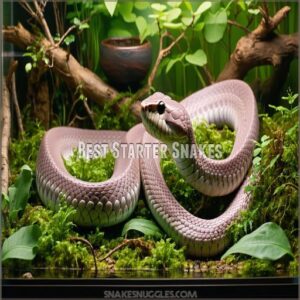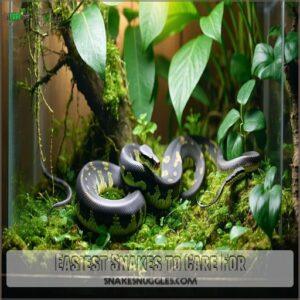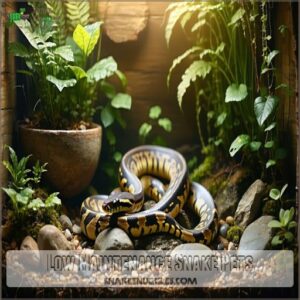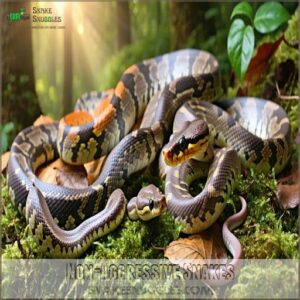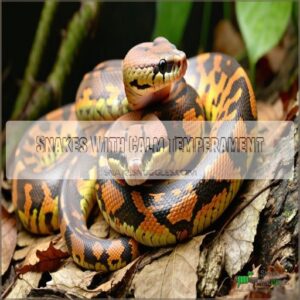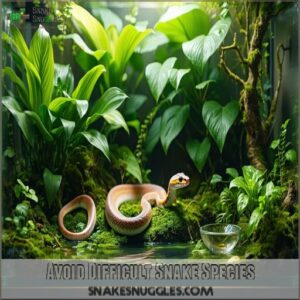This site is supported by our readers. We may earn a commission, at no cost to you, if you purchase through links.
 If you’re after a pet snake that stays small and suits beginners, you’ve got plenty of options!
If you’re after a pet snake that stays small and suits beginners, you’ve got plenty of options!
The Rosy Boa, Corn Snake, and Western Hognose are top picks—they’re calm, manageable in size (usually under 4 feet), and non-venomous.
Kenyan Sand Boas are another fantastic choice, growing just 1.5-3 feet and thriving in compact habitats.
For even tinier species, check out Milk Snakes, which stay under 4 feet, or Anthill Pythons, maxing out at 20 inches!
These snakes are easy to handle and care for, making them perfect for first-time owners.
Curious about creating the ideal setup for your new friend? Stay tuned!
Table Of Contents
- Key Takeaways
- Best Starter Snakes
- Docile Pet Snake Species
- Manageable Sized Snakes
- Easiest Snakes to Care For
- Snakes That Stay Small
- Low Maintenance Snake Pets
- Non-Aggressive Snakes
- Snakes With Calm Temperament
- Affordable Snake Options
- Avoid Difficult Snake Species
- Frequently Asked Questions (FAQs)
- What is the easiest small snake to take care of?
- What pet snake stays the smallest?
- What breed of snake is the smallest?
- What is the cutest snake to own?
- What is the ideal snake enclosure temperature?
- How often should small snakes be fed?
- Are small snakes prone to health issues?
- Can pet snakes bond with their owners?
- What are signs of a stressed snake?
- Conclusion
Key Takeaways
- You’ve got plenty of beginner-friendly small snake options like Rosy Boas, Corn Snakes, and Milk Snakes, all with calm temperaments and manageable sizes.
- Small snakes thrive in compact enclosures and require minimal care, making them perfect low-maintenance pets that suit apartments or smaller spaces.
- Feeding’s a breeze with frozen-thawed prey, and these snakes maintain a predictable schedule, eating once every 7-14 days depending on their size and age.
- Most beginner-friendly snakes, like Western Hognose and Anthill Pythons, stay under 4 feet and are non-aggressive, offering an easy and stress-free handling experience.
Best Starter Snakes
If you’re new to keeping snakes, species like the Rosy Boa and Corn Snake are excellent choices for beginner reptile enthusiasts.
They’re small, easy to handle, and have calm temperaments, making them a breeze to care for.
Rosy Boa
Looking for a calm, small pet snake that’s perfect for beginners? The rosy boa checks every box.
Native to the U.S. Southwest, this non-venomous snake tops out at about 46 inches and 3 pounds, making it among the most manageable small snake breeds. With a docile temperament, it’s a joy to handle.
For more information on pet corn snake care and other species, research is key. Boa feeding is straightforward—frozen and thawed rodents work best.
Prioritize proper pet boa care by mimicking its natural desert habitat for long-term health.
Corn Snake
Corn snakes are an awesome choice for beginner snake breeds.
These small pet snakes grow 2 to 6 feet, offering easy handling without overwhelming size.
Known for their calm nature, they’re friendly, non-venomous snakes perfect for building confidence.
Corn snake care includes a cozy, escape-proof habitat like a 30-gallon tank, proper heating, and humidity between 40-60%.
Feeding tips? Stick to frozen-thawed mice, a safe and hassle-free option.
With colorful morphs and a 15-20 year lifespan, corn snakes are a rewarding, low-maintenance companion.
Docile Pet Snake Species
Some of the smallest pet snake species also happen to be the most docile snakes, making them great for beginners.
If you’re after calm nature and friendly species, check these out:
- Milk Snakes: Beautifully patterned, typically gentle but a bit shy.
- Children’s Python: Tiny “gentle giants” that outgrow their hatchling feistiness.
- Western Hognose: Quirky snake behavior with nonaggressive tendencies.
- Rosy Boas: Relaxed, lovable, and ideal pet handling companions.
Many pet owners research docile snake breeds to find the perfect species for their lifestyle.
These docile snakes guarantee fun, low-stress ownership, which is a key aspect of having pet snakes, and they are often considered to be great companions.
Manageable Sized Snakes
Looking for manageable snake size limits? Small snake species like the Rosy Boa, Corn Snake, or Kenyan Sand Boa fit the bill perfectly.
These gentle giants are easy to handle, thrive in compact enclosures, and stay under 4 feet.
For more information on great pet snakes, research is key to finding the perfect breed for your lifestyle.
| Snake Breed | Typical Size | Temperament |
|---|---|---|
| Corn Snake | 2-6 feet | Calm & Docile |
| Kenyan Sand Boa | 1.5-3 feet | Gentle & Relaxed |
| Rosy Boa | 2-4 feet | Friendly |
Non-venomous snakes with simple diet needs like frozen-thawed prey make pet snake care stress-free!
Easiest Snakes to Care For
Not all snakes are created equal in care, and if you’re just starting out, choosing the easiest snakes to care for can make all the difference.
These species are known for their manageable size, gentle nature, and simple upkeep. When selecting a pet snake, researching the best snakes for handling is vital to a positive experience.
- Ball Pythons: These gentle snake species are famously easygoing and low-maintenance. Plus, their 20+ year lifespan means plenty of long-term bonding.
- Corn Snakes: Known for being non-aggressive snakes, corn snakes are hardy, adapt well to their environments, and rarely stress over handling.
- Hatchlings: Starting small pays off! The smallest pet snakes as hatchlings grow slowly, giving you plenty of time to master pet snake health and care.
- Boa Constrictors: Don’t let their name fool you—they’re surprisingly docile and straightforward to handle with easy handling techniques.
With the easiest snakes to care for, you’ll enjoy designing habitats, mastering snake feeding tips, and building trust with your new scaly friend.
Snakes That Stay Small
Choosing a tiny pet snake comes with plenty of perks.
Small snake species are perfect for beginners or those short on space, as they fit comfortably into compact enclosures.
Many of these smallest pet snakes stay small, rarely exceeding 4 feet.
They’re easy to handle, often quite docile, and won’t overwhelm you regarding care requirements.
For best care, understanding small pet needs is essential for a healthy and thriving pet.
Here’s a quick spotlight on a few favorites:
| Snake Species | Average Size | Temperament | Ideal For | Fun Fact |
|---|---|---|---|---|
| Corn Snake | 2-6 ft | Calm, Curious | Beginners, Families | Amazing escape artists! |
| Milk Snake | 14-48 in | Calm, Shy | Small Spaces, Novices | Their bright bands mimic venomous snakes. |
| Rosy Boa | 18-46 in | Gentle | New Owners | Rolls into a “rosy” ball when stressed. |
| Anthill Python | ~20 in | Peaceful | Kids, Apartments | The world’s smallest python species! |
| Western Hognose | Under 2 ft | Feisty, Fun | Experienced Novices | Plays dead like a reptile actor! |
Stick with these small snakes that stay small, and you’re in for an enjoyable, manageable experience with your new pet.
Low Maintenance Snake Pets
Small pet snakes that stay small are usually a great fit for someone looking for low maintenance snakes. These beginner snake breeds, like the rosy boa or ball python, are known for being simple to care for while offering years of companionship.
Setting up an ideal snake habitat doesn’t need to feel overwhelming—just verify proper heating, a secure enclosure, and clean water. Many owners find that researching low maintenance care helps them provide a better environment for their pets.
Pet costs stay manageable too. These snakes thrive on frozen-thawed prey, which is easy to store and budget-friendly. Plus, hypoallergenic species mean fewer worries for allergy-prone owners.
When it comes to care basics, small snakes don’t demand constant attention. Minimal cleanup is a bonus since many shed less frequently. For anyone new to reptile ownership, these pets provide the perfect balance of ease, affordability, and enjoyment.
Non-Aggressive Snakes
Not all cute tiny snakes make great pets if they’re quick to lash out.
That’s why zeroing in on non-aggressive snakes is a game-changer for beginners. These gentle species rarely bite, hiss, or make you feel like you’re handling live dynamite. Instead, they’re easygoing and perfect for those still getting the hang of pet safety and basic snake behavior.
Here’s a shortlist of small breeds known for their calm nature:
- Corn Snakes: The sweethearts of the snake world, they’re practically people-pleasers and rarely show aggression.
- Rosy Boas: With their soft, chilled-out vibe, these little snakes are a joy to handle.
- Western Hognose Snakes: Feisty but all bark and no bite—great for beginner snake breeds.
- Ball Pythons: Famous for literally curling into a ball when nervous rather than striking—a go-to for handling tips.
These tiny snakes combine manageable size and temperament, making them ideal companions with a calm nature.
Snakes With Calm Temperament
If you’re looking for small pet snakes with calm temperaments, you’re in luck—there are plenty of gentle giants in reptiles.
Species like Ball Pythons, Rosy Boas, Corn Snakes, Milk Snakes, and Children’s Pythons are praised for their calm behaviors and docile snake personalities.
These peaceful species thrive in captivity with proper care and make excellent companions for beginners.
Ball Pythons, for instance, are known for their “curl into a ball” reaction when stressed, showing just how non-aggressive they are.
Corn Snakes, on the other hand, are a breeze to handle and adapt well to different environments.
Rosy Boas are some of the smallest snake breeds, staying laid-back as long as their habitat stays consistent.
To make certain these docile snakes remain happy, focus on their temperament traits—steady temperatures, secure enclosures, and the right food.
With patience, you’ll build trust with these peaceful species.
Affordable Snake Options
Finding budget-friendly pets like small pet snakes doesn’t mean skimping on quality or care.
Some small snake breeds are both affordable and easy to maintain, making them perfect for beginners.
These breeds offer a great starting point for those looking for affordable options, with several species standing out for their low cost and ease of care.
Here are some great options for cheap snake care:
- Corn Snakes: These non-venomous snakes cost as little as $15 and thrive in simple, economical enclosures with easy-care needs.
- Kingsnakes or Milk Snakes: Similarly priced ($15–$75), they don’t ask for much beyond a small tank and occasional frozen feeders.
- Ball Pythons: Low-cost housing (30-gallon tanks) and affordable feeders ($1/week in bulk) make them a favorite.
- Sand Boas: These tiny snakes are calm, non-shedding, and live comfortably in low-maintenance setups.
By sticking to beginner-friendly, affordable species, you’ll enjoy fulfilling snake ownership without breaking the bank.
Just start with one snake to keep care manageable.
Avoid Difficult Snake Species
Not all small snake breeds are beginner-friendly.
Snakes like the African rock python are more than just their impressive size—they’re challenging species with aggressive tendencies, considerable handling issues, and care challenges that demand expertise.
At over 20 feet long, their need for secure, massive enclosures and large prey, such as chickens, makes them unsuitable for newbies.
Even smaller snakes can have quirks.
Ball pythons, though a popular pick, are known for feeding problems, while the Western hognose snake’s dramatic defensive displays can catch you off guard.
Milk snakes may bolt if startled and release a foul-smelling musk when handled poorly.
For beginners seeking the smallest pet snakes, stick to tiny snakes like non-venomous, easy-to-care-for rosy boas or corn snakes for a smoother start.
Frequently Asked Questions (FAQs)
What is the easiest small snake to take care of?
Caring for a corn snake is as easy as pie.
They’re ideal for beginners seeking a low-maintenance, friendly companion.
These docile snakes stay small, grow 2-6 feet, and thrive on simple setups with frozen mice.
What pet snake stays the smallest?
The Barbados threadsnake holds the title for the smallest pet snake, staying around 4 inches long.
Though rare as a pet, its tiny size makes it a fascinating choice for enthusiasts seeking a truly miniature snake.
What breed of snake is the smallest?
You’re curious about the tiniest snakes? The title of the tiniest snake species goes to the Barbados threadsnake, with adults averaging 4 inches (10 cm) and hatchlings a mere 4 inches (1 cm).
What is the cutest snake to own?
Cutest snake? Hands down, the Western Hognose.
With its upturned snoot and playful “death faker” act, it looks like a cartoon villain.
Add its small size and sweet temperament, and you’ve got pure reptilian charm!
What is the ideal snake enclosure temperature?
Aim for a warm side: most beginner-friendly snakes thrive with a temperature gradient of 75-85°F.
Cooler spots let them relax; warmer ones for digestion.
Use thermometers to keep it steady—snakes appreciate consistency!
How often should small snakes be fed?
Feeding small snakes isn’t rocket science!
Hatchlings thrive on weekly meals, while adults eat every 10–14 days.
Always match prey size to your snake’s width—too big, and digestion becomes a real nightmare.
Are small snakes prone to health issues?
Small snakes aren’t necessarily prone to health issues, but poor care can lead to troubles like respiratory infections or shedding problems.
Keep enclosures clean, maintain proper humidity, and watch for signs like lethargy or loss of appetite.
Can pet snakes bond with their owners?
Snakes don’t bond like dogs or cats, but they do recognize routines, scents, and handling.
With patience, your snake learns you’re safe, not a threat.
It’s more trust-based than love—but still pretty rewarding!
What are signs of a stressed snake?
Nearly 70% of reptile owners misinterpret stress signs in their pets.
Watch for tail rattling, persistent hiding, lack of appetite, or excessive hissing.
If your snake looks tense or panicked, it’s likely stressed.
Conclusion
Who knew small snakes could make such big impressions?
From the calm Rosy Boa to the adorable Anthill Python, these species prove you don’t need a giant to enjoy reptile companionship.
Whether you’re drawn to their manageable size, easy care needs, or gentle temperament, these snakes are perfect for beginners.
Ready to start your journey? Use this “20 smallest pet snakes that stay small beginner snake breed guide” to find the right scaly companion for your setup, and discover the joy of reptile companionship.
- https://www.snakesforpets.com/small-pet-snakes-that-stay-small/
- https://pethelpful.com/reptiles-amphibians/The-Smallest-Pet-Snakes-for-Beginners-with-Easy-Care
- https://www.petmd.com/reptile/slideshows/best-captive-bred-snakes-stay-small
- https://a-z-animals.com/animals/snake/snake-facts/pet-snakes-that-stay-small/
- https://pangovet.com/pet-breeds/snakes/small-pet-snakes-that-stay-small/

